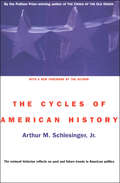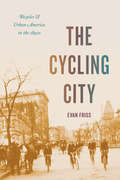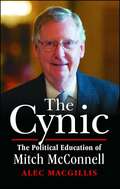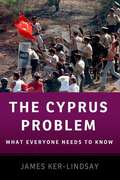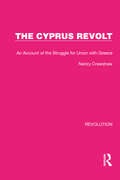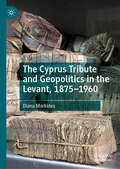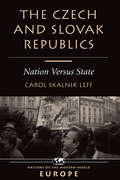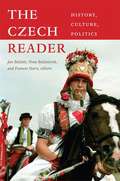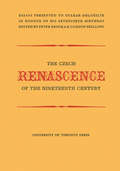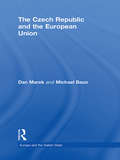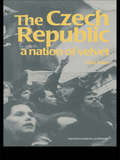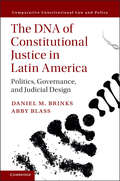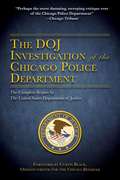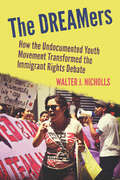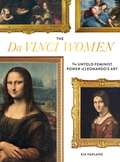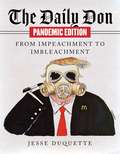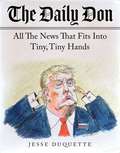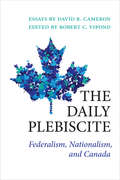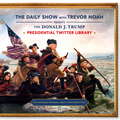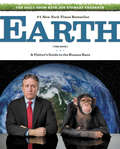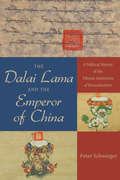- Table View
- List View
The Cycles of American History
by Arthur M. Schlesinger Jr.A Pulitzer Prize–winning historian discusses &“the Cold War, political parties, the presidency, and many broader philosophical issues [with] incisive wit&” (Library Journal). A celebrated historian, speechwriter, and adviser to President Kennedy, Arthur M. Schlesinger Jr. draws on decades of astute observation to construct a dialectic of American politics, or as Time magazine called it, a &“recurring struggle between pragmatism and idealism in the American soul.&” The Cycles of American History traces two conflicting visions of America—Experiment vs. Destiny—through two centuries of political evolution, conflict, and progress. In this updated edition, Schlesinger reflects on the dawn of a new millennium and how new social and technological revolutions could lead to a revolution in American political cycles. &“Whatever the nation&’s political future, it can benefit from the intelligence and regard for our country&’s best traditions evident in these informed and humane essays.&” —TheNew York Times &“Displays the author at his best: trenchant, erudite, crisp.&” —Foreign Affairs &“An excellent and provocative primer on the challenges surrounding the contemporary American political setting . . . First-rate history mixed with a strong sense of public service.&” —The Christian Science Monitor
The Cycling City: Bicycles and Urban America in the 1890s
by Evan FrissCycling has experienced a renaissance in the United States, as cities around the country promote the bicycle as an alternative means of transportation. In the process, debates about the nature of bicycles--where they belong, how they should be ridden, how cities should or should not accommodate them--have played out in the media, on city streets, and in city halls. Very few people recognize, however, that these questions are more than a century old. The Cycling City is a sharp history of the bicycle's rise and fall in the late nineteenth century. In the 1890s, American cities were home to more cyclists, more cycling infrastructure, more bicycle friendly legislation, and a richer cycling culture than anywhere else in the world. Evan Friss unearths the hidden history of the cycling city, demonstrating that diverse groups of cyclists managed to remap cities with new roads, paths, and laws, challenge social conventions, and even dream up a new urban ideal inspired by the bicycle. When cities were chaotic and filthy, bicycle advocates imagined an improved landscape in which pollution was negligible, transportation was silent and rapid, leisure spaces were democratic, and the divisions between city and country were blurred. Friss argues that when the utopian vision of a cycling city faded by the turn of the century, its death paved the way for today's car-centric cities--and ended the prospect of a true American cycling city ever being built.
The Cynic: The Political Education of Mitch McConnell
by Alec MacgillisFrom a dogged political reporter, an investigation into the political education of Mitch McConnell and an argument that this powerful Senator embodies much of this country's political dysfunction.Based on interviews with more than seventy-five people who have worked alongside Mitch McConnell or otherwise interacted with him over the course of his career, The Cynic, which will be published as an original ebook, is both a comprehensive biography of one of this country's most powerful politicians and a damning diagnosis of this country's eroding political will. Tracing his rise from a pragmatic local official in Kentucky to the leader of the Republican opposition in Washington, the book tracks McConnell's transformation from a moderate Republican who supported abortion rights and public employee unions to the embodiment of partisan obstructionism and conservative orthodoxy on Capitol Hill. Driven less by a shift in ideological conviction than by a desire to win elections and stay in power at all costs, McConnell's transformation exemplifies the "permanent campaign" mindset that has come to dominate American government. From his first race for local office in 1977--when the ad crew working on it nicknamed McConnell "love-me-love-me" for his insecurity and desire to please--to his fraught accommodation of the Tea Party, McConnell's political career is a story of ideological calcification and a vital mirror for understanding this country's own political development and what is wrought when politicians serve not at the behest of country, but at the behest of party and personal aggrandizement.
The Cyprus Problem: What Everyone Needs To Know
by James Ker-LindsayIn The Cyprus Problem: What Everyone Needs to Know®, James Ker-Lindsay--recently appointed as expert advisor to the UN Secretary-General's Special Advisor on Cyprus--offers an incisive, even-handed account of the conflict. Ker-Lindsay covers all aspects of the Cyprus problem, placing it in historical context, addressing the situation as it now stands, and looking toward its possible resolution. The book begins with the origins of the Greek and Turkish Cypriot communities as well as the other indigenous communities on the island (Maronites, Latin, Armenians, and Gypsies). Ker-Lindsay then examines the tensions that emerged between the Greek and Turkish Cypriots after independence in 1960 and the complex constitutional provisions and international treaties designed to safeguard the new state. He pays special attention to the Turkish invasion in 1974 and the subsequent efforts by the UN and the international community to reunite Cyprus. The book's final two chapters address a host of pressing issues that divide the two Cypriot communities, including key concerns over property, refugee returns, and the repatriation of settlers. Ker-Lindsay concludes by considering whether partition really is the best solution, as many observers increasingly suggest. <p><p> Written by a leading expert, The Cyprus Problem brings much needed clarity and understanding to a conflict that has confounded observers and participants alike for decades.
The Cyprus Revolt: An Account of the Struggle for Union with Greece (Routledge Library Editions: Revolution #9)
by Nancy CrawshawThis book, first published in 1978, examines the local and international aspects of the struggle for Greek union with Cyprus – Enosis. The revolt against the British colonial power was a struggle in which guerrilla warfare, political action and international diplomacy were integrated to bring about union with Greece under the camouflaged objectives of self-determination and anti-colonialism. This book traces the origins of the dispute from the Greek War of Independence of 1821 and then deals in depth with the revolt and its international repercussions up to Independence in 1960 and the Turkish military intervention of 1974.
The Cyprus Tribute and Geopolitics in the Levant, 1875–1960
by Diana MarkidesThis book examines the history of the Cyprus Tribute, and takes a longer and broader view of the issue than previous studies. It analyses the regional context of the decision to use revenue surpluses for the repayment of debt within the framework of the Eastern Question and Ottoman bankruptcy. We see that the island was always strategically and financially overshadowed by Egypt. Scrutinising political developments in Cyprus through the prism of the tribute issue facilitates a better understanding of its considerable effect on them. The absence of any imperial role for Cyprus as a 'place d’armes’ meant that there was no imperial interest in funding the infrastructural development of the island. British policy was treasury-driven. Diana Markides analyses why it failed, and how its failure resulted in the local colonial government having to impose a deeply unpopular fiscal policy, for which there was no adequate explanation. She examines the extent to which local resistance to this policy affected not only constitutional development on the island and Anglo-Cypriot relations, but the nature of the relations between the two major communities.
The Czech And Slovak Republics: Nation Versus State (Nations Of The Modern World: Europe Ser.)
by Carol LeffThis clear, objective introduction to the politics of Czechoslovakia and the successor Czech and Slovak republics builds a framework for understanding the dynamics of the triple transition: democratization, marketization, and a national transformation that has reconfigured the dynamic between state and nation. Offering a valuable case study of a country coming back to Europe, the books strong comparative element will make it invaluable to those seeking to understand the dynamics of transition in the region as a whole. }This clear, objective introduction to the politics of Czechoslovakia and the successor Czech and Slovak Republics provides a comprehensive analysis of Czechoslovakia in the postcommunist period. Carol Leff builds a framework for understanding the dynamics of the triple transition: democratization, marketization, and a national transformation that has reconfigured the dynamic between state and nation. She shows how the interaction of these three transformational agendas has shaped Czechoslovakias development, ultimately culminating in the paradoxical disintegration of a state that most of its citizens wished to preserve.The book offers a valuable case study of a country coming back to Europe, but it also provides an opportunity for analyzing the influence of communism on what had been a significant interwar European state. The books strong comparative element will make it invaluable as well for those seeking to understand contemporary central and eastern Europe. }
The Czech Reader: History, Culture, Politics (The World Readers)
by Robin Kirk Orin Starn Frances Starn Nina Bazantová Jan BaantThe Czech Reader brings together more than 150 primary texts and illustrations to convey the dramatic history of the Czechs, from the emergence of the Czech state in the tenth century, through the creation of Czechoslovakia in 1918 and the Czech Republic in 1993, into the twenty-first century. <P><P>The Czechs have preserved their language, traditions, and customs, despite their incorporation into the Holy Roman Empire, the Habsburg Empire, the Austro-Hungarian Empire, the Third Reich, and the Eastern Bloc. Organized chronologically, the selections in The Czech Reader include the letter to the Czech people written by the religious reformer and national hero Jan Hus in 1415, and Charter 77, the fundamental document of an influential anticommunist initiative launched in 1977 in reaction to the arrest of the Plastic People of the Universe, an underground rock band. There is a speech given in 1941 by Reinhard Heydrich, a senior Nazi official and Deputy Reich Protector of Bohemia and Moravia, as well as one written by Václav Havel in 1984 for an occasion abroad, but read by the Czech-born British dramatist Tom Stoppard, since Havel, the dissident playwright and future national leader, was not allowed to leave Czechoslovakia. Among the songs, poems, folklore, fiction, plays, paintings, and photographs of monuments and architectural landmarks are “Let Us Rejoice,” the most famous chorus from Bedřich Smetana’s comic opera The Bartered Bride; a letter the composer Antonín Dvořák sent from New York, where he directed the National Conservatory of Music in the 1890s; a story by Franz Kafka; and an excerpt from Milan Kundera’s The Joke. <P><P>Intended for travelers, students, and scholars alike, The Czech Reader is a rich introduction to the turbulent history and resilient culture of the Czech people.
The Czech Renascence of the Nineteenth Century
by Peter Brock H. Gordon SkillingLiterature and historical writing among the Czechs, as among many other nations lacking a political state, played a vital role in promoting national consciousness. This volume, written to honour the seventieth birthday of the eminent Czech historian Otakar Odložík, contains essays by outstanding scholars from Canada, Czechoslovakia, Britain, and the United States which examine significant episodes in the development of modern Czech nationalism from its origins in the late eighteenth century to the birth of an independent nation after the First World War. The main emphasis is on the middle decades of the nineteenth century, which were crucial for mapping the direction Czech nationalism was to take during the subsequent hundred years. The stand of the Czech and Slovak peoples in the crisis of August 1968 reflected the deep roots of their patriotism which developed during the nineteenth-century national renascence. This volume contains essays on Dobrovský, the pioneer of Czech language studies, and on Palacký, the author of the first great national history, as well as on other facets of literary history which have influenced national feeling. A Prague scholar investigates the social structure of the early Czech patriotic intelligentsia and reaches conclusions which considerably modify hitherto existing views. Two contributions examine the role of the press in the emergence of Czech nationalism; the Matice Ceskà, a leading patriotic literary foundation, is the subject of one of the studies. Slovak and Lusatian Serb, German, and American reaction to the Czech national renascence is examined in a series of chapters. The political expression of Czech nationalism, first during the Year of Revolutions, 1848, and then from the late 1870s until the early years of the twentieth century, is subjected to analysis in several studies. Finally, there is a brief review of the problems associated with the Czech-Slovak background of Tomáš Masaryk, the creator of modern Czechoslovakia. A fitting tribute to an outstanding scholar, this volume makes an important contribution to the literature in English on nineteenth-century Czech lands.
The Czech Republic and the European Union (Europe and the Nation State)
by Dan Marek Michael BaunThis book examines the relationship between the Czech Republic and the European Union (EU). The authors examine the Czech Republic’s road to EU membership in 2004 and assess how EU accession has affected or changed the Czech Republic, including its domestic politics, governing institutions and public policies. It also examines how the Czech Republic has behaved as an EU member state, addressing the questions: What are the Czech Republic’s interests in the EU and how has it sought to influence EU policymaking? How have Czech interests and behaviour been shaped by the country’s position as: a new member state; a small member state; a relatively poor member state; and a post-communist member state? The book also addresses the Czech Republic’s preparations for assuming the EU presidency in January 2009, and evaluates the actual conduct of the presidency. Although a case study of a single member state, this book sheds light on a number of broader points or issues pertaining to the EU and its member states. It contributes to academic debate and knowledge about the EU and European integration, including the debates on Europeanization and the role of small states in the EU. This book will of interest to students and scholars of the European Union, European politics and Post-Communist politics.
The Czech Republic: A Nation of Velvet (Postcommunist States and Nations)
by Rick FawnCzechoslovakia has captured the nation's imagination throughout the twentieth century. The Allied betrayal of the country to Nazi Germany in 1938 was to demonstrate the appalling consequences of naive appeasement of aggression. The wholesale reform of Soviet communism in the Prague Spring of 1968 won western support, and sympathy when it was crushed by Warsaw Pact tanks. The fierce communist regime thereafter was brought down almost magically in 1989. Czechoslovakia added to the international political vocabulary the term, 'Velvet Revolution', and the velvet metaphor has characterised much of the country's path-breaking postcommunist transformation and its peaceful break-up in 1993.In separate chapters on history, politics, economics, foreign relations and the new Czech identity, this book not only applauds the successes of the Czech Republic since 1993, but also uncovers the frayed edges of the velvet nation.
The DBQ Project Mini-Q's in Civics
by Laurel SingletonLearn more about being an American citizen by studying the culture, history and government of the US.
The DNA of Constitutional Justice in Latin America: Politics, Governance, and Judicial Design (Comparative Constitutional Law And Policy )
by Daniel M. Brinks Abby BlassIn recent times there has been a dramatic change in the nature and scope of constitutional justice systems in the global south. New or reformed constitutions have proliferated, protecting social, economic, and political rights. <P><P>While constitutional courts in Latin America have traditionally been used as ways to limit power and preserve the status quo, the evidence shows that they are evolving into a functioning part of contemporary politics and a central component of a system of constitutional justice. <P>This book lays bare the political roots of this transformation, outlining a new way to understand judicial design and the very purpose of constitutional justice. Authors Daniel M. Brinks and Abby Blass use case studies drawn from nineteen Latin American countries over forty years to reveal the ideas behind the new systems of constitutional justice. They show how constitutional designers entrust their hopes and fears to dynamic governance systems, in hopes of directing the development of constitutional meaning over time.
The DOJ Investigation of the Chicago Police Department: The Complete Report by The United States Department of Justice
by Department of Justice Curtis Black“Perhaps the most damning, sweeping critique ever of the Chicago Police Department.” —Chicago Tribune Chicago, 2016. In a time of civil unrest in America, when racism, brutality, and division have taken prominent places in the daily news, the federal government conducted an investigation into the affairs of the Chicago Police Department. It is only one of many instances where the federal government has issued investigations of law enforcement across the nation before President Obama’s term expired. In a searing report, the department of justice examines Chicago’s law enforcement officers and officials for period of nearly thirteen months, digging to uncover moral and legal infractions committed within the department. Revealed is a pattern of aggression, lack of training, excessive use of force, racism and racial profiling, among other misconduct. Read the report in its entirety here. This edition is sure to provide readers with eye-opening insight into an epidemic of injustice and oppression across a divided nation.
The DREAMers: How the Undocumented Youth Movement Transformed the Immigrant Rights Debate
by Walter J. NichollsOn May 17, 2010, four undocumented students occupied the Arizona office of Senator John McCain. Across the country a flurry of occupations, hunger strikes, demonstrations, and marches followed, calling for support of the DREAM Act that would allow these young people the legal right to stay in the United States. The highly public, confrontational nature of these actions marked a sharp departure from more subdued, anonymous forms of activism of years past. The DREAMers provides the first investigation of the youth movement that has transformed the national immigration debate, from its start in the early 2000s through the present day. Walter Nicholls draws on interviews, news stories, and firsthand encounters with activists to highlight the strategies and claims that have created this now-powerful voice in American politics. Facing high levels of anti-immigrant sentiment across the country, undocumented youths sought to increase support for their cause and change the terms of debate by arguing for their unique position-as culturally integrated, long term residents and most importantly as "American" youth sharing in core American values. Since 2010 undocumented activists have increasingly claimed their own space in the public sphere, asserting a right to recognition-a right to have rights. Ultimately, through the story of the undocumented youth movement, The DREAMers shows how a stigmatized group-whether immigrants or others-can gain a powerful voice in American political debate.
The DREAMers: How the Undocumented Youth Movement Transformed the Immigrant Rights Debate
by Walter J. NichollsOn May 17, 2010, four undocumented students occupied the Arizona office of Senator John McCain. Across the country a flurry of occupations, hunger strikes, demonstrations, and marches followed, calling for support of the DREAM Act that would allow these young people the legal right to stay in the United States. The highly public, confrontational nature of these actions marked a sharp departure from more subdued, anonymous forms of activism of years past. The DREAMers provides the first investigation of the youth movement that has transformed the national immigration debate, from its start in the early 2000s through the present day. Walter Nicholls draws on interviews, news stories, and firsthand encounters with activists to highlight the strategies and claims that have created this now-powerful voice in American politics. Facing high levels of anti-immigrant sentiment across the country, undocumented youths sought to increase support for their cause and change the terms of debate by arguing for their unique position-as culturally integrated, long term residents and most importantly as "American" youth sharing in core American values. Since 2010 undocumented activists have increasingly claimed their own space in the public sphere, asserting a right to recognition-a right to have rights. Ultimately, through the story of the undocumented youth movement, The DREAMers shows how a stigmatized group-whether immigrants or others-can gain a powerful voice in American political debate.
The Da Vinci Women: The Untold Feminist Power of Leonardo's Art
by Kia VahlandThis new biographical look at Leonardo da Vinci explores the Renaissance master's groundbreaking portrayal of women which forever changed the way the female form is depicted. Leonardo da Vinci was a revolutionary thinker, artist, and inventor who has been written about and celebrated for centuries. Lesser known, however, is his revolutionary and empowering portrayal of the modern female centuries before the first women's liberation movements. Before da Vinci, portraits of women in Italy were still, impersonal, and mostly shown in profile. Leonardo pushed the boundaries of female depiction having several of his female subjects, including his Mona Lisa, gaze at the viewer, giving them an authority which was withheld from women at the time. Art historian and journalist Kia Vahland recounts Leonardo's entire life from April 15, 1452, as a child born out of wedlock in Vinci up through his death on May 2, 1519, in the French castle of von Cloux. Included throughout are 80 sketches and paintings showcasing Leonardo's approach to the female form (including anatomical sketches of birth) and other artwork as well as examples from other artists from the 15th and 16th centuries. Vahland explains how artists like Raphael, Giorgione, and the young Titan were influenced by da Vinci's women while Michelangelo, da Vinci's main rival, created masculine images of woman that counters Leonardo's depictions.
The Daily Don Pandemic Edition: From Impeachment to Imbleachment
by Jesse DuquetteThe NEW Daily Don Pandemic Edition, political cartoon skewers the 45th with brilliant comic satire that covers the (hopefully) final two years of the Trump presidency. With the.daily.don&’s Instagram followers reaching 80,000, Jesse Duquette proves his brilliant cartoon accounts of the brutal Trump administration hit home. It began in the wake of the first Trump press conference that gave us the first &“Alternative Fact&” about inauguration crowd sizes and has continued daily, acting as a bizarre history, illustrating each daily outrage by Donald Trump. Picking up where the first book—The Daily Don: All the News that Fits into Tiny, Tiny Hands—left off, The Daily Don Pandemic Edition takes us from Trump&’s blatant attempt to cover up Russia&’s involvement in the 2016 election to his recommendation that Americans ingest disinfectant to cure coronavirus, and beyond. While Trump continues to shock and horrify on a daily, sometimes hourly, basis, Duquette keeps up with the outrageous sputter that shoots out of the president&’s mouth and perhaps other orifices with scathing satire that&’s both hilarious and, well, sad. This Pandemic Edition pulls together selections from Trump&’s (hopefully) last two-years in office and acts, again, as a semi-accurate record of what these strangest of strange times were like for those of us who were there and lived to tell the tale. Because there is still no better method to record a cartoon presidency than with colored pencils and markers.
The Daily Don: All the News That Fits into Tiny, Tiny Hands
by Jesse DuquetteThe Best of “The Daily Don,” political cartoon that documents all the covfefe of the administration of Donald Trump.The Daily Don is the best of artist Jesse Duquette’s fabulous Instagram gallery of political cartoons relating to the Trump administration. It began in the wake of the first Trump press conference that gave us the weird and unnecessary lie about crowd sizes. Right then, Jesse thought, if this was Day One and the lying was already this casual and obvious, what did this mean for Day 2? or Day 100? He drew his first picture: Sean Spicer delivering his line (“Period.”), added a quote from Orwell’s “1984” that seemed particularly relevant, and posted it to Instagram with the caption that he was going to attempt to document every day of the Administration until the end—a vow that he was maybe 35% serious about. But he has not missed a day and is still going strong. These drawings are the perfect antidote to the cries about “Fake News!” and “Build a Wall!” They help us all stay sane and smile (however nervously) through these strange times. This book pulls together selections from the first nearly-two-years in office—from Muslim bans to Melania jackets and all the beef-tweeting covfefe in between—and acts as a semi-accurate record of what these strangest of strange times were like for those of us who were there and lived to tell the tale. Because what better method to record a cartoon presidency than with colored pencils and markers?
The Daily Plebiscite: Federalism, Nationalism, and Canada (Political Development: Comparative Perspectives)
by David CameronFrom the mid-1960s through the mid-1990s, Canada was in a state of ongoing political crisis. Within this thirty-year period, David R. Cameron was an active participant and observer of Canada’s crisis of national unity. As a political scientist and former senior public servant, Cameron remains one of the most astute and respected analysts of Canadian federalism. This volume assembles some of Cameron’s best works on federalism, nationalism, and the constitution, including journal articles, book chapters, speeches, newspaper op-eds, and unpublished opinion pieces spanning nearly fifty years of engagement. In addition, The Daily Plebiscite includes a conversation between Cameron and Robert C. Vipond on the "long decade" of the 1980s in Canadian constitutional politics, a brief history of the mega-constitutional era, and concluding reflections on the broader lessons that other divided societies might take from the Canadian experience. Providing rich fare for anyone interested in questions of federalism, nationalism, and constitutionalism, The Daily Plebiscite offers an informed, insider’s perspective on the national unity question and considers the challenges faced by a federal, multinational, and multicultural country like Canada.
The Daily Show Presidential Twitter Library
by Trevor NoahAs seen on The Daily Show, an illustrated portrait of the Donald J. Trump Twitter account, with analysis and 'scholarly' commentary from the writers of The Daily Show and an introduction by Trevor Noah.In June 2017, just steps from Trump Tower in midtown Manhattan, The Daily Show with Trevor Noah opened The Donald J. Trump Presidential Twitter Library, a 4,000-square-foot museum space that gave the 45th president and his amazing Twitter legacy the respect they deserve. In the single weekend it was open to the public, the Library pop-up drew 7,500 visitors and had to turn away countless others.But the Presidential Twitter Library experience should not be limited to the elite coastal few. Not fair! All citizens, even the Mexican ones, should have the chance to see Donald Trump's tweets in their rightful context - organized and commented on in the fearless, hilarious, insightful voice of The Daily Show.This one-of-a-kind exhibition catalogue presents the Library's complete contents, including:The Masterpieces: In-depth critical appreciations of history's most important Trump tweets, from 'Very Stable Genius' to 'Covfefe' to 'Trump Tower Taco Bowl/I Love Hispanics!'The Greatest Battles: @realDonaldTrump's brutal Twitter campaigns against fellow Republicans, Diet Coke, women generally, and Kristen Stewart specificallySad! A Retrospective: a compendium of the many people, events and twists of fate that apparently made Donald Trump feel this human emotionTrumpstradamus: DJT's amazing 140-character predictions-none of which came true!The Hall of Nicknames: the greatest of Trump's monikers, from 'Lyin' Ted' to 'Low I.Q. Crazy Mika', accompanied by original caricature artworkTrump vs. Trump: You're going to want to sit for this one. Donald Trump has sometimes been known to contradict himself.Always the Best: the greatest boasts of the greatest boaster of all time, ever!Comprising hundreds of Trump tweets, and featuring a foreword by Pulitzer Prize-winning historian Jon Meacham, and even a place for readers to add their own future Trump tweet highlights - because he is making new Twitter history literally every day - The Donald J. Trump Presidential Twitter Library is a unique portrait of an artist whose masterworks will be studied by historians, grammarians, and mental health professionals for years to come.
The Daily Show with Jon Stewart Presents Earth (The Book)
by Jon StewartThe New York Times bestseller from Emmy-winning, Oscar-hosting, Daily Show-anchoring Jon Stewart--the man behind the megaseller America (The Book) -- is now available as an ebook! Where do we come from? Who created us? Why are we here? These questions have puzzled us since the dawn of time, but when it became apparent to Jon Stewart and the writers of The Daily Show that the world was about to end, they embarked on a massive mission to write a book that summed up the human race: What we looked like; what we accomplished; our achievements in society, government, religion, science and culture -- all in a tome of approximately 256 pages with lots of color photos, graphs and charts. After two weeks of hard work, they had their book. EARTH (The Book) is the definitive guide to our species. With their trademark wit, irreverence, and intelligence, Stewart and his team will posthumously answer all of life's most hard-hitting questions, completely unburdened by objectivity, journalistic integrity, or even accuracy.
The Daily Thomas Paine: A Year of Common-Sense Quotes for a Nonsensical Age (A Year of Quotes)
by Thomas PaineThomas Paine was the spark that ignited the American Revolution. More than just a founding father, he was a verbal bomb-thrower, a rationalist, and a rebel. In his influential pamphlets Common Sense and The American Crisis, Paine codified both colonial outrage and the intellectual justification for independence, arguing consistently and convincingly for Enlightenment values and the power of the people. Today, we are living in times that, as Paine famously said, “try men’s souls.” Whatever your politics, if you’re seeking to understand the political world we live in, where better to look than Paine? The Daily Thomas Paine offers a year’s worth of pithy and provocative quotes from this quintessentially American figure. Editor Edward G. Gray argues that we are living in a moment that Thomas Paine might recognize—or perhaps more precisely, a moment desperate for someone whose rhetoric can ignite a large-scale social and political transformation. Paine was a master of political rhetoric, from the sarcastic insult to the diplomatic aperçu, and this book offers a sleek and approachable sampler of some of the sharpest bits from his oeuvre. As Paine himself says in the entry for January 20: “The present state of America is truly alarming to every man who is capable of reflexion.” The Daily Thomas Paine should prove equally incendiary and inspirational for contemporary readers with an eye for politics, even those who prefer the tweet to the pamphlet.
The Dalai Lama and the Emperor of China
by Peter SchwiegerA major new work in modern Tibetan history, this book follows the evolution of Tibetan Buddhism's trülku (reincarnation) tradition from the seventeenth to the nineteenth centuries, along with the Emperor of China's efforts to control its development. By illuminating the political aspects of the trülku institution, Schwieger shapes a broader history of the relationship between the Dalai Lama and the Emperor of China, as well as a richer understanding of the Qing Dynasty as an inner Asian empire, the modern fate of the Mongol empire, and current Sino-Tibetan relations.Unlike other pre-twentieth century Tibetan histories, this volume rejects hagiographic texts in favor of diplomatic, legal, and social sources held in the private, monastic, and bureaucratic archives of old Tibet. This approach draws a unique portrait of Tibet's rule by reincarnation while shading in peripheral tensions in the Himalayas, eastern Tibet, and China. Its perspective fully captures the extent to which the emperors of China controlled the institution of the Dalai Lamas, making a groundbreaking contribution to the past and present history of East Asia.
The Dalai Lama and the Emperor of China: A Political History of the Tibetan Institution of Reincarnation
by Peter SchwiegerA major new work in modern Tibetan history, this book follows the evolution of Tibetan Buddhism's trülku (reincarnation) tradition from the seventeenth to the nineteenth centuries, along with the Emperor of China's efforts to control its development. By illuminating the political aspects of the trülku institution, Schwieger shapes a broader history of the relationship between the Dalai Lama and the Emperor of China, as well as a richer understanding of the Qing Dynasty as an Inner Asian empire, the modern fate of the Mongols, and current Sino-Tibetan relations. Unlike other pre-twentieth-century Tibetan histories, this volume rejects hagiographic texts in favor of diplomatic, legal, and social sources held in the private, monastic, and bureaucratic archives of old Tibet. This approach draws a unique portrait of Tibet's rule by reincarnation while shading in peripheral tensions in the Himalayas, eastern Tibet, and China. Its perspective fully captures the extent to which the emperors of China controlled the institution of the Dalai Lamas, making a groundbreaking contribution to the past and present history of East Asia.
